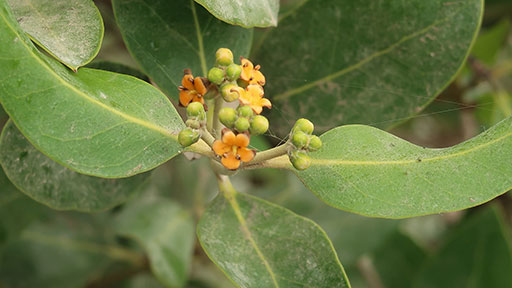
Jubail island is situated in between Saadiyat island and Yas Island in Abu Dhabi. No bus stop nearby. From Yas Island taxi service cost 40 Dhs. Pre booked free tourist bus service available from Abu Dhabi and Yas island for tourists to enjoy the beauty of mangrove park. By car an average of 20 minutes drive is enough to reach the park. This park was opened on January 2020. Ticket charge is Dhs 15 per person. Free entry for children below the age of 7.
Online booking possible https://jubail-mangrove-park.checkfront.com/reserve/


Mangroves include shrubs and trees (Avicennia, Rhizophora, Bruguiera, Sonneratia) adapted to live in saline marshy habitat inundated with water and belongs to the family Acanthaceae. 75% of mangrove vegetation in UAE is located in Abu Dhabi Jubail Island. Jubail Mangrove park is a hotspot area where there is thick aggregation of Avicennia marina species commonly known as grey mangrove living in harsh environment of high temperature and salinity.
The fruits of mangroves have special character showing the phenomenon called vivipary. The embryo can develop while the fruit is still attached to the mother plant. In Rhizophora species, the radicle meant for the formation of root become very long elongated protrude out of the fruit and because of the weight due to gravitational force the seedling is established to the marshy soil below leading to natural colonization. If there is tidal water the fruit can float to the nearby coastal areas and established the seedling there.


The mangroves are characterized by special aerial roots known as pneumatophores. Some of the lateral roots grow up against gravitational force vertically up. This is an adaptation to suck the oxygen from the air by means of minute pores present in the aerial roots known as pneumatothodes (modified lenticels). The soil contain saline water with low oxygen content. The root need oxygen for respiration. Supply of oxygen is done effectively using these aerial roots. Other species prop root and aerial roots are seen in addition to pneumatophores. Leaves thick leathery and evergreen. Flowers colourful to attract insects for pollination.


The mangroves provide shelter for fishes, crabs, barnacles and many species of birds, blue green algae, sea grass etc., and protect the coastal areas from soil erosion, tidal waves, wind and even tsunami. 13 species of carbs have been reported in Al Jubail Mangrove park. Wood is very strong and durable. UAE is trying to support the ecosystem by planting new population of mangroves. Eliminating mangrove forest for housing industrial park, commercial building, harbours are not allowed in UAE.
Mangrove national park is open to public all days and best place for students and tourists for getting first hand knowledge and for enjoying the beautiful scenery, No life guards available. During high tide condition water level increase children need to be supervised by adults all the time. Scooters, bicycles not allowed. Water bottle allowed but single use plastics not allowed.
Kayaking activities using normal and electric boats connecting community to the beauty of ecosystem.
Youtube video link – https://bit.ly/3zrrRBe